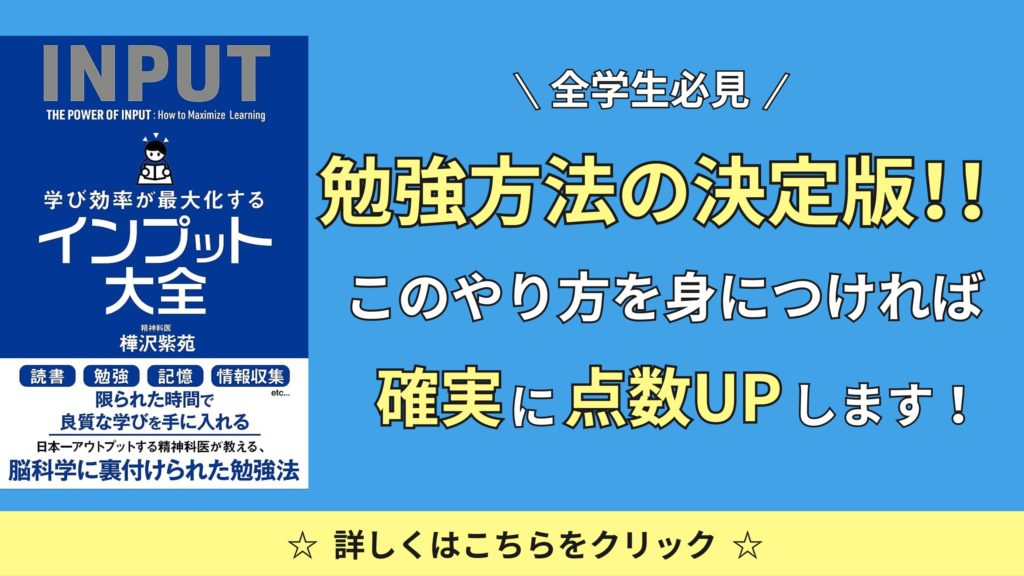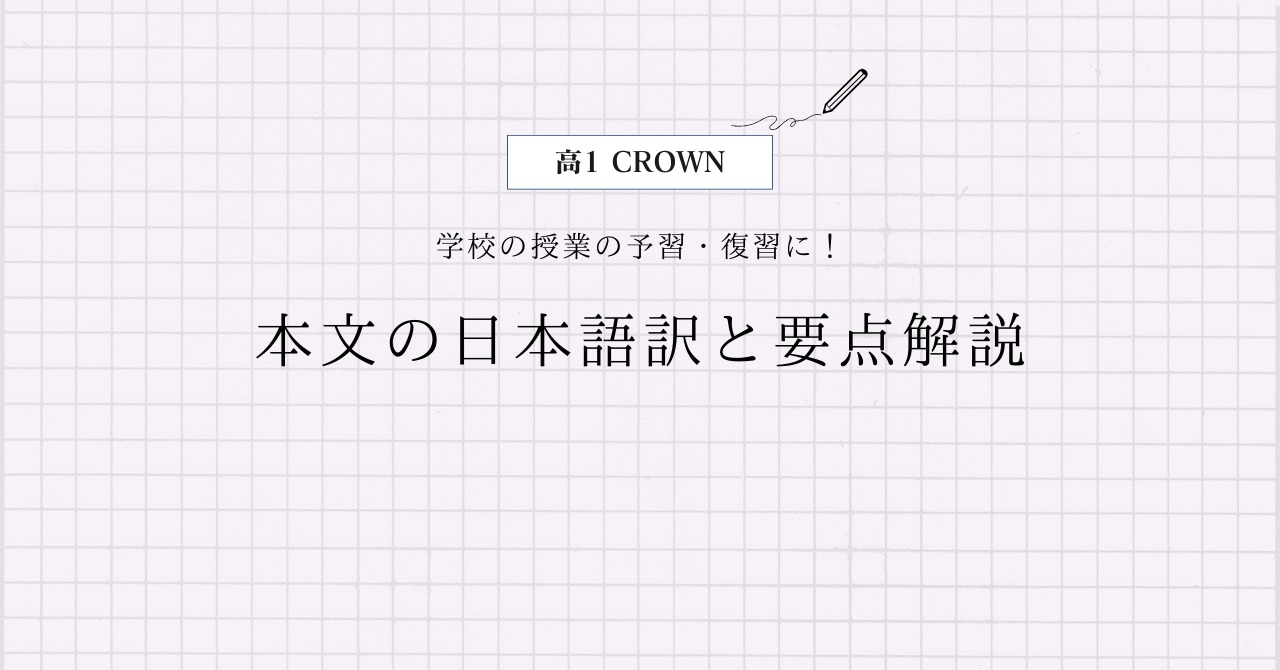三省堂 高1CROWN English Communication1 Lesson5 Section4の本文の日本語訳と重要箇所の解説です。
Section5-1, 5-2, 5-3の解説はこちらからご覧ください。
>高1CROWN English Communication1 Lesson5 Section1 本文和訳
>高1CROWN English Communication1 Lesson5 Section2 本文和訳
>高1CROWN English Communication1 Lesson5 Section3 本文和訳
- CROWN English Communication1 Lesson5 Section4 本文と日本語訳
- CROWN English Communication1 Lesson5 Section4 重要事項の解説
- Are you worried about our future?
- Yes, I am. But my hope lies in young people.
- That’s why I started Roots & Shoots.
- It began with a group of high school students in Tanzania in 1991.
- It is called Roots & Shoots because roots can work their way through rocks to reach water.
- And shoots can break through a wall to reach the sunlight.
- The rocks and wall are the problems humans have caused to our earth.
- Is it a kind of club for young people?
- Yes. We now have groups all over the world and each group chooses three projects: one to help people, one to help animals, one to help the environment.
- The world is a better place when a sad person smiles at you, when a dog wags its tail for you, when you give water to a thirsty plant.
- That’s what Roots & Shoots is all about.
- Some final words?
- People should think about the consequences of the little choices they make each day.
- What to buy? What to eat? What to wear?
- You are just one person, but what you do affects the whole world.
- The changes you make may be small, but if a thousand, then a million, finally a billion people all make those changes, this is going to make a big difference.
- Dr. Goodall, thank you very much for sharing your ideas with us.
- CROWN English Communication1 Lesson5 Section4 まとめ
CROWN English Communication1 Lesson5 Section4 本文と日本語訳
Ken: Are you worried about our future?
「私たちの将来を心配していますか?」
Jane: Yes, I am. But my hope lies in young people.
「はい。しかし私の希望は若者たちの中にあります。」
That’s why I started Roots & Shoots.
「そういうわけで,私は『Roots & Shoots』を始めました。」
It began with a group of high school students in Tanzania in 1991.
「それは1991年にタンザニアの高校生のグループから始まりました。」
It is called Roots & Shoots because roots can work their way through rocks to reach water.
「根は水に辿り着くために岩を通って苦労して進むので,『Roots & Shoots』と呼ばれています。」
And shoots can break through a wall to reach the sunlight.
「そして芽は日光を浴びるために壁を破ります。」
The rocks and wall are the problems humans have caused to our earth.
「岩と壁は人間が地球に引き起こしている問題のことです。」
Ken: Is it a kind of club for young people?
「それは若者たちの一種の部活動のようなものですか?」
Jane: Yes. We now have groups all over the world and each group chooses three projects: one to help people, one to help animals, one to help the environment.
「そうです。私たちは今世界中にグループがあって,各グループは3つのプロジェクトを選びます。3つとは,人を助ける,動物を助ける,環境を助けるというプロジェクトです。」
The world is a better place when a sad person smiles at you, when a dog wags its tail for you, when you give water to a thirsty plant.
「悲しんでいる人があなたに微笑むとき,犬があなたに尻尾を振るとき,乾いた植物に水をあげるとき,世界はより良い場所になります。」
That’s what Roots & Shoots is all about.
「それが『Roots & Shoots』に関するすべてです。」
Ken: Some final words?
「最後に何かありますか?」
Jane: People should think about the consequences of the little choices they make each day.
「人々は毎日行う小さな選択の結果について考えるべきです。」
What to buy? What to eat? What to wear?
「何を買えばいいのか?何を食べればいいのか?何を着たらいいのか?」
You are just one person, but what you do affects the whole world.
「あなたはただの1人の人間ですが,あなたがすることは世界全体に影響を及ぼします。」
The changes you make may be small, but if a thousand, then a million, finally a billion people all make those changes, this is going to make a big difference.
「あなたが起こす変化は小さいかもしれませんが,もし1,000人,それから100万人,ついには10億人全員がそういった変化を起こせば,これは大きな違いを生むでしょう。」
Ken: Dr. Goodall, thank you very much for sharing your ideas with us.
「グドール博士,あなたの考えを共有していただき本当にありがとうございました。」

CROWN English Communication1 Lesson5 Section4 重要事項の解説
Are you worried about our future?
“be worried about~”で「~を心配する」という表現になります。
Yes, I am. But my hope lies in young people.
“hope”は「希望,望み」という名詞で,“lie”は「横たわる,嘘をつく」という動詞です。
“lie in~”で「~の中にある」といった意味になります。
That’s why I started Roots & Shoots.
“That’s why~”は「そういうわけで~」という重要表現になります。
“why”の前には“the reason(理由)”が省略されていて,文法上は「関係副詞why」ということですね。
It began with a group of high school students in Tanzania in 1991.
“It”は“Roots & Shoots”を指していますね。
“begin with~”は「~から始まる」という表現です。
“of”は前置詞で,”A of B”の形で「BのA」というように後ろから前に訳します。
It is called Roots & Shoots because roots can work their way through rocks to reach water.
“It”は前の文の活動のことを指していますね。そして「受動態」になっています。
また,この文は「接続詞because」も使われていますね。
“root”は「根」,“rock”は「岩」という名詞,“work one’s way”は「苦労して進む」,“through”は「~を通って」という前置詞になります。
“can”は「~だろう」といった可能性の意味で使われていると思いますが,今回は特に訳していないです。
“reach”は「に辿り着く,到達する」という動詞で,“to reach”は「不定詞の副詞的用法」ですね。
And shoots can break through a wall to reach the sunlight.
“shoot”は「芽」,“wall”は「壁」,“sunlight”は「日光」という名詞になります。
“break through”は「を破る」といった意味です。
ここの“to reach”も「不定詞の副詞的用法」ですね。
The rocks and wall are the problems humans have caused to our earth.
この文では「目的格の関係代名詞that/which」が省略されていて,“humans have caused to our earth”が先行詞“the problems”を修飾しています。
“problem”は「問題」,“human”は「人間」,“earth”は「地球」という名詞で,“cause”は「を引き起こす」という動詞になります。
また,「現在完了」も使われていますね。
Is it a kind of club for young people?
“it”は“Roots & Shoots”を指していますね。
“a kind of~”は「~の一種」という表現で,“club”は「クラブ,部活」という名詞です。
Yes. We now have groups all over the world and each group chooses three projects: one to help people, one to help animals, one to help the environment.
“all over the world”は「世界中に」といった意味です。
“each”は「それぞれの」という形容詞で,後ろには名詞の単数形が来て,全体としても単数扱いとなりますよ。
“choose”は「を選ぶ」という動詞で,“project”は「プロジェクト,企画」という名詞になります。
最後の「:」は「コロン」と言い,簡単に言うと「つまり」という具合に直前の文章を補足します。コロンを使うときは,コロンの前は必ず文にしないといけない点に注意してください。
“one”は代名詞で,“project”を指しています。
“environment”は「環境」という名詞で,“to help”はすべて“one”を修飾する「不定詞の形容詞的用法」です。
The world is a better place when a sad person smiles at you, when a dog wags its tail for you, when you give water to a thirsty plant.
“better”は“good”の「比較級」ですね。
また,「接続詞when」が使われています。
“place”は「場所」,“plant”は「植物」という名詞で,“sad”は「悲しい」,“thirsty”は「のどが渇いた,乾燥した」という形容詞,“smile”は「微笑む」,“wag”は「を振る」という動詞になります。
“smile at~”で「に微笑む」となり,“give 人 もの”は「人にものをあげる」となって,“give もの to 人”でも同じ意味になります。
That’s what Roots & Shoots is all about.
“what”は「関係代名詞」で,“the thing which/that~(~ということ)”という意味となり,“Roots & Shoots is all about”が先行詞“the thing”を修飾しています。
元々は“That’s the thing.”と“Roots & Shoots is all about the thing.”という2文で,“about”の目的語“the thing”が関係代名詞whatに変わったということですね。
“That”はこれまでの内容全体を指しています。
“all about~”は「~に関するすべて」という意味になります。
Some final words?
“final”は「最後の」という形容詞です。
直訳すると「最後の言葉は何か?」といった感じです。
People should think about the consequences of the little choices they make each day.
“should”は「~すべきだ,のはずだ」という助動詞ですね。
“consequence”は「結果」,“choice”は「選択」という名詞です。
“make choice”で「選択を行う」,“little”は「小さい」という形容詞,“each day”は「毎日,日々」という意味になります。
また,この文では「目的格の関係代名詞that/which」が省略されていて,“they make each day”が先行詞“the little choices”を修飾しています。
“they”は“people”を指していますね。
What to buy? What to eat? What to wear?
この3つはすべて「疑問詞+不定詞」になっています。
“wear”は「を着る」という動詞ですね。
You are just one person, but what you do affects the whole world.
“just”は「ただ~だけ,ちょうど」といった副詞です。
この“what”も「関係代名詞」で,“you do”が先行詞“the thing”を修飾しています。
“affect”は「に影響を及ぼす」という動詞で,“whole”は「全体の」という形容詞です。
The changes you make may be small, but if a thousand, then a million, finally a billion people all make those changes, this is going to make a big difference.
“change”は「変化」という名詞です。
また,この文でも「目的格の関係代名詞that/which」が省略されていて,“they make each day”が先行詞“The changes”を修飾しています。
“may”は「~かもしれない」という助動詞で,後ろの文では「接続詞if」が使われていますね。
“thousand”は「千(の)」,“million”は「100万(の)」,“billion”は「10億(の)」という意味で,“then”は「それから,その後,そのとき」,“finally”は「最終的に,ついに」といった副詞です。
“those”は“that”の複数形ですが,訳すときは「それらは(の)」と訳すことが多いです。
“this”は直前の文全体を指していて,“make a difference”は「違いを生む」という重要表現になります。
Dr. Goodall, thank you very much for sharing your ideas with us.
thank you for~”は「~してくれてありがとう」という重要表現になります。今回は“very much(とても)”が間に入っていますね。
“share”は「を共有する,分ける」という動詞で,“share A with B”で「AをBと共有する」という意味になります。
前置詞“for”の後ろなので“sharing”と「動名詞」になっています。

CROWN English Communication1 Lesson5 Section4 まとめ
以上がCROWN English Communication1 Lesson5 Section4の日本語訳となります。
「関係代名詞what」などの使い方をしっかり確認しておきましょう!
>高1CROWN English Communication1 Lesson5 Section1 本文和訳
>高1CROWN English Communication1 Lesson5 Section2 本文和訳
>高1CROWN English Communication1 Lesson5 Section3 本文和訳
何か分からない点や他に解説してほしい点があれば,お気軽にコメントしてください!




コメント